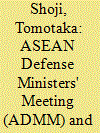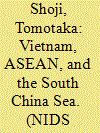|
|
|
Sort Order |
|
|
|
Items / Page
|
|
|
|
|
|
|
| Srl | Item |
| 1 |
ID:
128973


|
|
|
|
|
| Publication |
2013.
|
| Summary/Abstract |
This paper explores the ASEAN Defense Ministers' Meeting (ADMM) and the ADMM Plus, focusing
on ASEAN's purpose to launch a meeting of defense ministers in terms of community building, the
evolution of the ADMM with the ensuing establishment of its enlarged version - the ADMM Plus, and
the significance of the ADMM Plus from a comparative perspective. A brief analysis of the approach
taken by Japan toward this multilateral framework, as a long-time dialogue partner of ASEAN, is
added to the conclusion. Generally, the ADMM and the ADMM Plus processes have so far developed
steadily, materializing in an incremental way the original visions to promote institutionalization
and practical cooperation. It is highly likely that the ADMM Plus will regularize the annual joint
exercises in nontraditional security based on the system of rotational Expert Working Groups
(EWGs). Activities in the ADMM (Plus) imply ASEAN's strong will to differentiate the framework
from the ASEAN Regional Forum (ARF), which countries concerned have found to be ineffective
for promoting conflict prevention and dealing with confrontational, sensitive issues of traditional
security, like the South China Sea. Today, the participants in the ADMM Plus including Japan seem
to fully recognize the utility of the platform. This is not only in terms of having a regular meeting
venue of relevant defense ministers, but also fostering deeper cooperation of defense and security by
conducting meetings at various levels of defense officials and joint exercises in nontraditional security
areas. However, the participants in the multilateral framework are going to see some future challenges
for the relevance of the mechanism, including territorial and maritime disputes.
|
|
|
|
|
|
|
|
|
|
|
|
|
|
|
|
| 2 |
ID:
122599


|
|
|
|
|
| Publication |
2012.
|
| Summary/Abstract |
Against the backdrop of China's growing assertiveness on sovereign and strategic interests in the
South China Sea, territorial disputes in this resource-rich sea area have re-emerged among the
claimants, including some ASEAN members. Vietnam in particular has been increasingly concerned
about China's expanding physical presence and assertive, sometimes aggressive, actions to manage
natural resources. Vietnam strives to check China's rise not by "containing" the country using military
options, but to place the issue on the agenda of ASEAN-centered multilateral dialogue frameworks
and achieve a breakthrough by making use of the collective diplomatic power of ASEAN, and as
appropriate, the engagement of countries outside of the region. Furthermore, Vietnam endeavors to
strengthen its hedging against the rise of China by carefully forging closer ties with the US. The
Philippines, too, increasingly views China's movements with caution, and is reinforcing its ASEANcentered diplomatic activities as well as promoting security cooperation with the US. In contrast,
Malaysia has not made any notable moves other than modernizing its naval capabilities. Indonesia,
as the ASEAN Chair in 2011, was proactive in conducting multilateral talks by hosting a series of
ASEAN-related meetings. ASEAN members are expected to continue to pursue multi-dimensional
diplomacy toward the peaceful settlement of disputes. The challenge will be how ASEAN will be able
to maintain its unity.
|
|
|
|
|
|
|
|
|
|
|
|
|
|
|
|
|
|
|
|
|